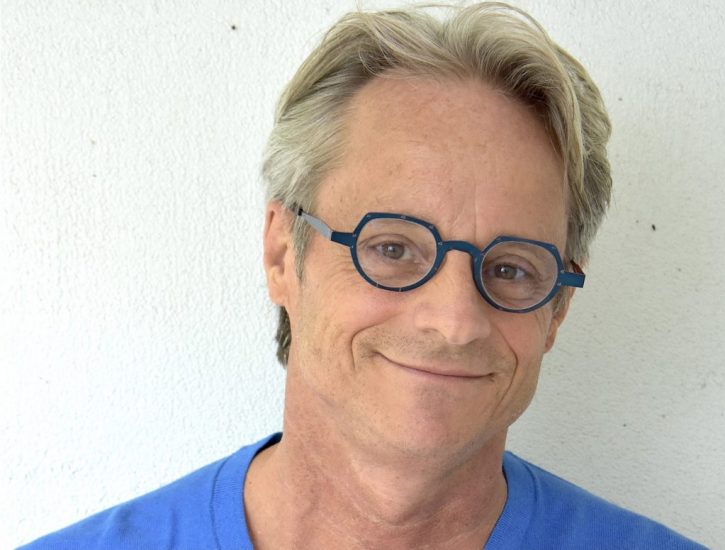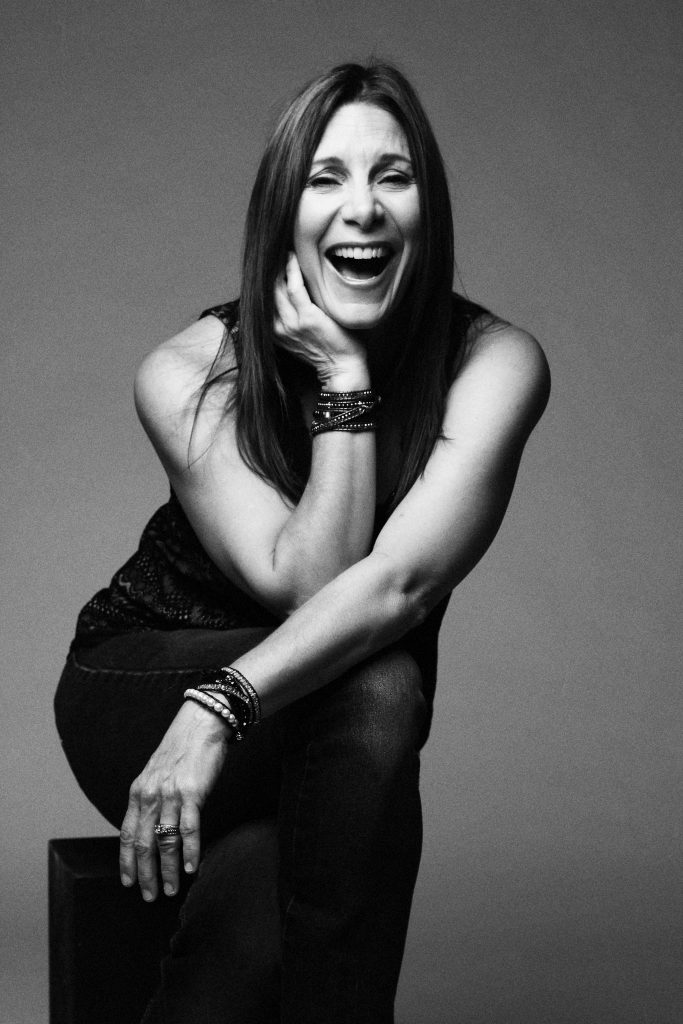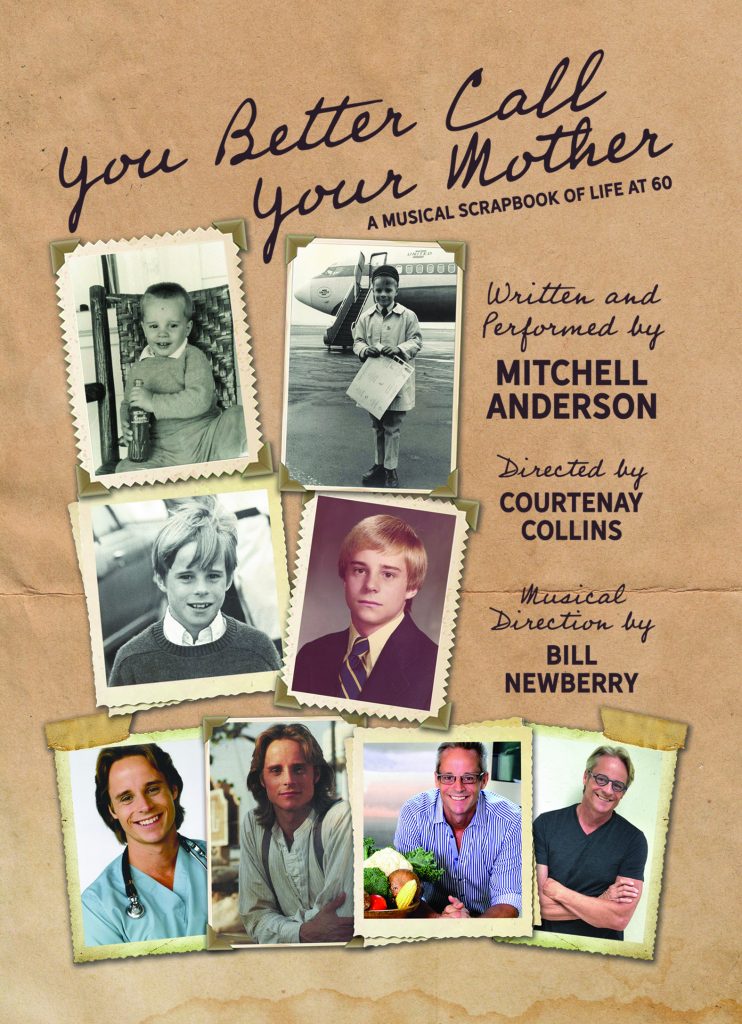Q&A: Mitchell Anderson and Courtenay Collins on Staging ‘You Better Call Your Mother’
Last week, after a five-hour rehearsal of his one-man show “You Better Call Your Mother” with director Courtenay Collins, Mitchell Anderson says the memorized words of the two-act play finally became real for him.
“The most important thing is to be in the moment and that’s how I try to live my life,” says Anderson. “But especially as an actor, you memorize, memorize, memorize, get it all down and then, finally, you can allow yourself to be in the moment and grow and breathe with an audience. Last night for the first time in rehearsal, I felt that for the first time.”
And then the reality of being the restaurateur behind two busy Atlanta locations of MetroFresh also set in when he realized he had to be back in the kitchen at 4:30 am. With the help of Collins, a veteran Atlanta cabaret performer (who inspired the city’s entire theater community when she made the successful transition from the Alliance Theatre world premiere of “The Prom” in 2016 to Broadway in 2018, creating the role of Mrs. Greene in the hit Tony nominated musical), Anderson has been juggling both jobs now for weeks.
Opening tonight for four sold-out shows at Synchronicity Theatre, “You Better Call Your Mother” is Anderson’s deeply personal and deeply funny 60th birthday present to himself, as the “Doogie Howser, M.D.,” “Party of Five” and “After Forever” actor recounts his Hollywood career, his activism, his life and his loves.
The show’s title comes from an aside a GLAAD publicist made to Anderson immediately after he unexpectedly came out to Hollywood at the GLAAD Media Awards in 1996, a full year before Ellen DeGeneres in 1997 and a decade before his “Doogie Howser, M.D.” co-star Neil Patrick Harris came out in 2006. The impromptu announcement catapulted Anderson onto the cover of The Advocate and a series of speaking engagements at Human Rights Campaign fundraising dinners across the country, including one here in Atlanta in 1997 where he ended up meeting his future husband, salon owner and photographer Richie Arpino.
During a Zoom interview with Eldredge ATL, Anderson and Collins discussed their stage collaboration, the origins of the show and the “quiet activism” Anderson enjoys these days while helping to nourish Atlantans as the chef behind the counter at MetroFresh and as an actor on stage.
Eldredge ATL: How did you get involved in this project, Courtenay?
Courtenay Collins: Mitchell called me and said he had an idea for a cabaret show, just for his friends and family, to celebrate his 60th birthday. He said he had done a little writing and asked what he should do. I said, “Get a few songs together, songs that mean something to you and write down a few stories.” Two weeks later, we got together at my house and he plunks down this heavy script on my piano! He read through it for me. Tears are streaming down my face and then I’m hysterically laughing. When he finished, I told him, “I hate to disappoint you, Mitchell. This isn’t a cabaret. It’s a play, it’s a one-man show that people need to hear, that you need to perform and I want to direct it.”
Mitchell Anderson: Rich, you know that I’m an overachiever [both laugh]. It probably won’t shock you that I turned up with a two-act play. However, I didn’t even tell [husband] Richie [Arpino] about it until it was done. To get that kind of feedback from Courtenay, someone I respect so much, was spectacular.
Eldredge ATL: Courtenay, I can’t think of anyone more qualified to direct this since you know the unique terror of getting up on stage by yourself. You’ve done this high wire act. What kind of feedback and direction were you able to offer?
Courtenay Collins: I wrote this in my notes to him last night: “One-person shows are hard.” [both laugh]. I just told him to enjoy the audience and to let them in. That’s going to give him the time to breathe. It also allows them on stage with you and it helps energize and focus you as a performer. It gives you time to remember why you’re telling these stories. All of a sudden, you’ve got to be an actor playing you.
Eldredge ATL: This is a very funny show but also a deeply personal one. Were there any stories that you considered off limits?
Mitchell Anderson: For me, the arc of the stories about my relationship with my parents were super important to include. My relationship I had with my former partner was important to put in there. At 60, I was able trace the path that allowed me to have this amazing full life with the knowledge that my parents were proud of me, that I’ve had love and happiness, that hard work and success have been in my life. Once we get to this age, that’s what we all want. Being able to spend the last year mining those moments of my life has been interesting. The great thing about working with Courtenay on this is we both believe this is a universal story. As we age, we all look for the approval and love of our parents and how we fit into the family picture, no matter who we are.
Eldredge ATL: How did you end up selecting the songs for the show?
Mitchell Anderson: “Father to Son” from “Falsettos” was a song that I knew had to be in the show. I had seen the Broadway revival of that show about a month after my father passed away. It’s right at the end of the first act. I remember just being inconsolable when that first act came down. That song is what you want your father to sing to you. And then “You’ve Got to Be Carefully Taught” from “South Pacific” and “(You’ve Gotta Have) Heart” from “Damn Yankees” is a mash up in the show because I was in both of those shows in high school.
Eldredge ATL: In a lot of respects, the show builds to that fateful night in 1996 at the GLAAD Media Awards. I didn’t know this story from your life.
Mitchell Anderson: I was very complicated in 1996. I was a 35-year-old working actor and a lot of my life was spent in this activist realm, both in politics and HIV/AIDS treatment and fundraising. It was kind of two levels of knowing. But when you talked to the press, you weren’t supposed to say anything. That frustration was really complicated at age 35. I wasn’t 23. You’re a man. You were supposed to show up. That’s why I say in the show, that night changed my life. That evening ended up making the rest of my life possible.
Eldredge ATL: What I love about that moment in the show is that younger people coming to see this are going to get a little LGBTQ+ history thrown in. They’re going to discover that guy serving up turkey chili at their favorite Midtown lunch spot is also a reason lives got easier for a generation of other LGBTQ people.
Courtenay Collins: Absolutely. That’s one thing I learned about Mitchell from working on this project with him. He was actually a poster child for gay rights and activism and gay marriage. I loved learning about that part of his life. Younger people need to see this because they’re going to see that it wasn’t so easy. They’re also going to see that the struggles they might be going through now with their families, he went through the same struggles. When Mitchell reveals these very personal things about growing up gay in a family and wanting acceptance and not knowing if he’s going to get it, it’s incredibly powerful.
Mitchell Anderson: It’s been almost exactly 25 years since that night at the GLAAD Awards and things have changed for sure. Actors like Matt Bomer can come out and still get parts everywhere, gay, straight whatever he wants to play. But back then, if you wanted to playing leading men roles, you needed to shut up. Nothing had changed since the era of Rock Hudson. We are fortunate now, 25 years later, it’s a different world.
Eldredge ATL: The people who only know you as an actor might be surprised that you wrote this show. But for 16 years now, the MetroFresh customers who receive your daily email know that you routinely write about personal aspects of your life. How did that daily act of writing at 4:30 each morning inform the writing of this play?
Mitchell Anderson: A lot. It’s probably the reason I showed up at Courtenay’s house with a full play! That muscle has been exercised every single day for 16 years. I put that email out there without any sense if people read it. It’s like a journal. Courtenay talks about the value of journaling and that’s what that email has become for me. It’s my moment each day, no matter how busy I am in that kitchen, to write two paragraphs about a thought, about an event or an emotion. I felt confident about the writing of this show because of that daily email, because I practice at it all the time.
Eldredge ATL: Courtenay, as the director “You Better Call Your Mother,” what do you think this show is going to bring to audiences right now?
Courtenay Collins: We’re all trying to make sense of the world right now. We’re all asking, “Why did this happen to me, what am I here for, what am I supposed to do?” Mitchell is so candid in this show, it inspires each of us to look at our lives and examine how everything fits together. It’s going to bring people so much joy at a time when we really need it. People are really going to be inspired by his bravery. It’s going to have audiences asking about how to be brave in their own lives and encourage them to tell their own story and be who they are and how to be authentic without being afraid.
“You Better Call Your Mother,” a one-man show starring Mitchell Anderson and directed by Courtenay Collins, runs at Atlanta’s Synchronicity Theatre, 1545 Peachtree Street, NE, tonight through Sunday. For more info, go to Brown Paper Tickets.
If you go: Synchronicity Theatre requires all patrons to provide proof of vaccination or a negative COVID test within 72 hours and audience members are required to wear masks.

Richard L. Eldredge is the founder and editor in chief of Eldredge ATL. As a reporter for the Atlanta Journal-Constitution and Atlanta magazine, he has covered Atlanta since 1990.






